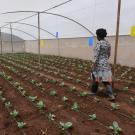This journal article was published in 2018 in the International Society for Horticultural Science's (ISHS) Acta Horticulturae as part of the III All-Africa Horticulture Congress. The article was co-authored by Thibaud Martin, M. Saidi, S. Niassy, S. Simon, F. Vidogbena, L. Parrot, S. Ekesi, E. Deletre, S. Subramanian, F. Assogba-Komlan, V. Baird, K.K.M. Fiaboe, M. Ngouajio, J. Simon and A. Ratnadass in Acta Horticulturae. The journal article was supported by research on the Horticulture Innovation Lab project focused on assessing feasibility of pest-exclusion nets in Kenya, led by Vance Baird of Michigan State University.
Abstract
Fruits and vegetables are important commodities in global agriculture. However, in Sub-Saharan Africa, production is sub-optimal in terms of yield, quality and environmental health practices due to several constraints such as insect pests which reduce yields through direct damage, or indirectly as disease vectors often promoting microbial diseases. Pest control still relies mainly on chemicals with their associated risks of resistance selection and toxicity to humans and environment. Several alternatives including biopesticides, semiochemical and nets are being explored in pest management. Insect nets applied on tomatoes, cabbages, beans and leafy vegetables protect them from flies, butterflies, moths, albeit to a lesser extent, whiteflies, aphids and thrips reducing their outbreaks as compared to open cultivation. As a result, pest control is limited and yield quantity and quality are improved. Insect nets are safe and cost effective for a period of 3-5 years if well maintained, and they may be re-used and recycled. Insect nets applied on cabbages in Benin yielded three-fold more profit than current practice. However, insect nets are not effective against all pests inclusion of insect attractants or repellents may enhance efficacy of netting technology. The use of insect nets offers a cost-effective insect pest management option to smallholder vegetable growers. The full benefit will be achieved with intensified extension efforts to make this technology better known.
Martin, T., M. Saidi, S. Niassy, S. Simon, F. Vidogbena, L. Parrot, S. Ekesi, E. Deletre, S. Subramanian, F. Assogba-Komlan, W. V. Baird, K.K.M. Fiaboe, M. Ngouajio, J. Simon and A. Ratnadass. 2018. Insect net: A novel technology to promote integrated pest management on horticultural crops in Africa. Acta Hortic. 1125. ISHS. doi:10.17660/ActaHortic.2018.1225.5
If you encounter problems accessing the full text of this journal article, you may contact one of the authors. The corresponding author can be contacted at thibaud.martin@cirad.fr.

